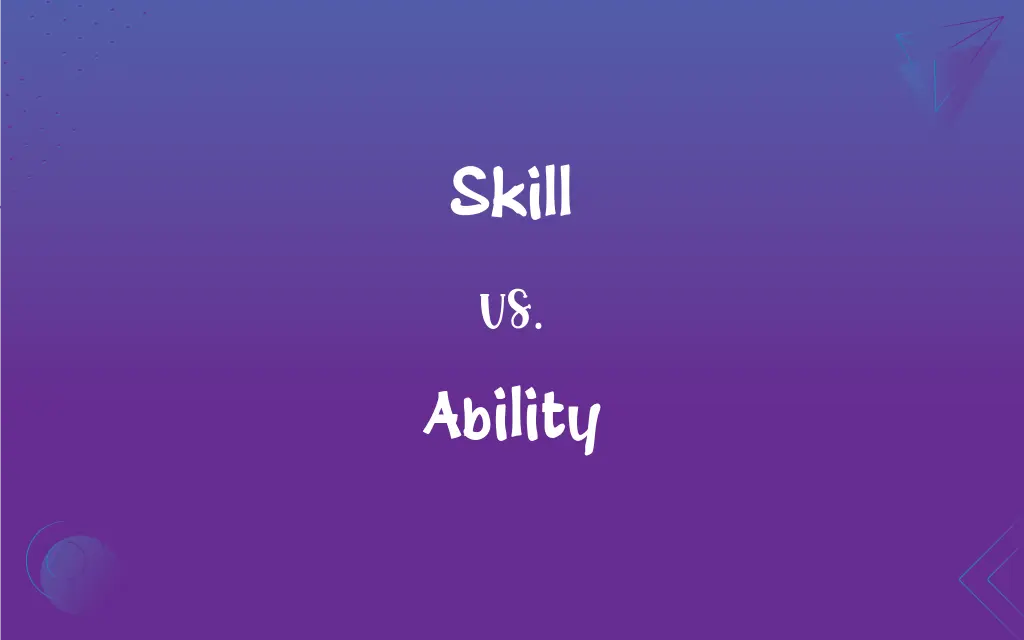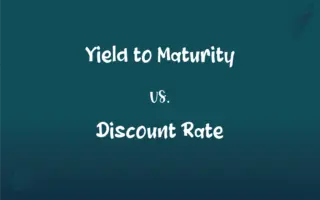Skill vs. Ability: What's the Difference?
Edited by Aimie Carlson || By Harlon Moss || Published on December 11, 2023
Skill refers to learned or acquired proficiency in a specific activity, while ability denotes natural or inherent talent or competence in a broad range of activities.

Key Differences
Skills are specific competencies or proficiencies acquired through training or experience, such as playing a musical instrument or coding. Abilities, on the other hand, are innate or natural talents, like having an aptitude for mathematics or a good memory.
A person develops skills through practice and education, indicating a level of mastery in certain tasks. Abilities are more inherent, often indicating a person’s potential to develop skills in various areas.
Skills can be technical, like computer programming, or soft, like effective communication. Abilities encompass a wider range of innate talents, including physical capabilities like strength or agility and cognitive abilities like problem-solving or creativity.
Skills are often measurable and can be certified, such as a degree in a specific field or a professional certification. Abilities are more subjective and are often observed through performance but are not typically certified.
The acquisition of a skill is often a deliberate process, requiring dedication and effort. An ability can be seen as a foundation that facilitates the learning of related skills, often without the need for deliberate effort.
ADVERTISEMENT
Comparison Chart
Nature
Acquired or learned
Innate or natural
Development
Through training and experience
Inherent potential
Types
Technical, soft
Physical, cognitive
Measurement
Often measurable and certifiable
Subjective and observed
Role in Learning
Requires deliberate effort
Facilitates skill development
ADVERTISEMENT
Skill and Ability Definitions
Skill
Proficiency gained through training or experience.
Her piano-playing skill improved with practice.
Ability
Natural talent or competence.
Her ability to understand complex concepts quickly is impressive.
Skill
Can be technical, like computer programming.
She honed her skill in programming to become a software developer.
Ability
Can include physical capabilities like strength.
Her physical ability makes her an outstanding athlete.
Skill
A specific ability developed through learning.
His skill in graphic design is evident in his work.
Ability
Innate potential in a broad range of activities.
His athletic ability was evident from a young age.
Skill
Often measurable through tests or certifications.
He earned a certification to validate his skill in digital marketing.
Ability
Encompasses cognitive abilities like problem-solving.
His ability to solve difficult puzzles is remarkable.
Skill
Includes soft skills like communication or teamwork.
Effective communication is a crucial skill in management.
Ability
More subjective and observed in performance.
Her ability in strategic thinking has contributed greatly to her career.
Skill
Proficiency, facility, or dexterity that is acquired or developed through training or experience
Painted with great skill.
Ability
The quality of being able to do something, especially the physical, mental, financial, or legal power to accomplish something.
Skill
A developed talent or ability
Improved his writing skills.
Ability
A skill, talent, or capacity
A student of many abilities.
FAQs
Can a skill be innate?
No, skills are acquired through learning and practice.
Can skills be improved?
Yes, skills can be significantly improved with practice and training.
Are abilities limited to physical traits?
No, abilities also include cognitive and emotional traits.
Can abilities be measured?
Abilities are more subjective and are usually observed rather than measured precisely.
Are abilities fixed?
Abilities can evolve and develop, especially when supported by learning and practice.
Can someone be skilled without having a natural ability?
Yes, skills can be acquired even without a natural predisposition through dedication and training.
Are communication skills innate?
While some may have a natural ability for communication, effective communication skills are typically learned and honed.
Is talent the same as skill?
Talent often refers to natural ability, while skill is specifically developed through practice.
Is a professional degree a reflection of skill?
Yes, degrees often certify the acquisition of specific skills.
Do skills require continuous practice?
Yes, maintaining and improving skills often requires ongoing practice.
Is ability always present from birth?
Abilities can be inherent, often observed early but can also develop over time.
Is creativity a skill or an ability?
Creativity can be seen as an inherent ability, but creative skills can be developed and refined.
Can abilities become skills?
Yes, natural abilities can be the foundation for developing specific skills.
Are leadership qualities skills or abilities?
Leadership can be a mix of innate abilities and learned skills.
Is learning a new language a skill or an ability?
Learning a new language is a skill that can be developed, though some may have a natural ability that facilitates it.
Do skills fade over time?
Without practice, some skills can diminish, but they can also be relearned or refreshed.
Are all abilities visible or obvious?
Not always; some abilities, especially cognitive or emotional ones, may not be immediately apparent.
Can anyone develop any skill?
With enough practice and dedication, most skills can be developed, though the ease of learning varies.
Is intelligence an ability or a skill?
Intelligence is generally considered an innate ability, but specific intellectual skills can be developed.
Can skills be taught?
Yes, skills can be taught and learned through various methods.
About Author
Written by
Harlon MossHarlon is a seasoned quality moderator and accomplished content writer for Difference Wiki. An alumnus of the prestigious University of California, he earned his degree in Computer Science. Leveraging his academic background, Harlon brings a meticulous and informed perspective to his work, ensuring content accuracy and excellence.
Edited by
Aimie CarlsonAimie Carlson, holding a master's degree in English literature, is a fervent English language enthusiast. She lends her writing talents to Difference Wiki, a prominent website that specializes in comparisons, offering readers insightful analyses that both captivate and inform.

































































